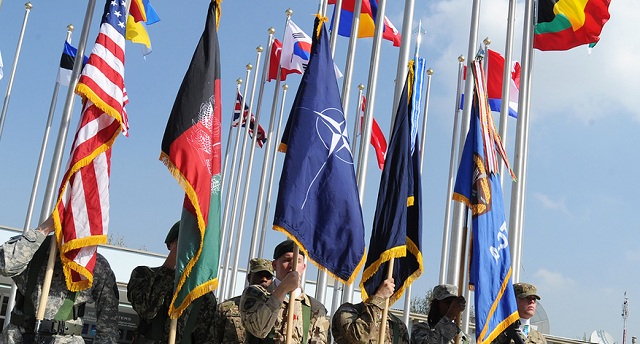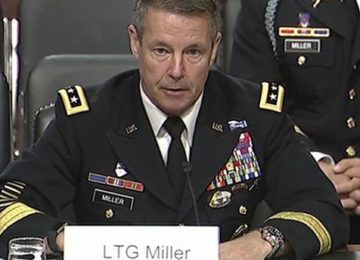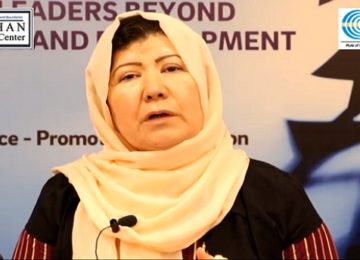December 16, 2019
By Imtiaz Gul
As violence, the controversy over contentious election results, and the reconciliation process for peace in Afghanistan continue, Chris Alexander – a former Canadian ambassador and deputy head of the United Nations mission in Afghanistan – has offered yet another skewed view on the situation in the embattled country – a classical example of the duplicity of geo-politics.

His response to The Afghanistan Papers published recently by The Washington Post amounts to yet another typical paradoxical piece on Afghanistan. The author, recalling his cumulative eight years of experience in that country, explicitly dubs the US-led NATO strategy as failed and incoherent, yet, conveniently, dumps the blame of failures on Pakistan.
As I glanced through his article, I thought for a while as if I was listening to Amrullah Saleh and Rehmatullah Nabil, both of whom are known for strong anti-Pakistan stance in Afghanistan.
“Long before The Washington Post revealed the Afghanistan Papers, it was obvious that the U.S.-led conflict was an incoherent mess. But it’s not too late to do things that will remedy some of its original mistakes – namely, hold neighbouring Pakistan to account,” concludes Chris Alexander.
The Afghanistan Papers, by contrast, confirm what Afghans, Americans and citizens of most NATO countries have known for some time: This campaign has been marked by incoherent strategy and deflection of responsibility. (These papers) tap into deep-seated American wariness about what office-holders might be doing behind their backs, especially in wartime.
Alexander lists some of the most glaring factors that alienated locals and fuelled the insurgency. These include:
– stained U.S. credibility because of Illegal detention and torture
– thousands of civilian casualties caused by U.S. airstrikes
– U.S. failure to support disarmament, while simultaneously allowing U.S. commanders to grease the palms of local power-brokers, put new, well-armed wildcards onto the landscape and benefited the Taliban
– a shift in U.S. talent and attention away from Afghanistan to Iraq,
– division within NATO over Iraq invasion, “a cacophony of clashing views and self-serving policies.”
– exclusion of the Taliban from the late 2001 Bonn conference (as also underlined by Barnett Rubin, the veteran Afghan expert)
– contradictions in the US counter-narcotics policy; with spending often going in the wrong directions, and
– corruption within the system
The endless list of failures notwithstanding, not to speak of the shortcomings – corruption, mismanagement, warlordism pointed out repeatedly by John Sopko, the US Special Inspector-General for Afghanistan Reconstruction’s (SIGAR), Alexander, as usual, takes a swipe at Pakistan, by holding it singularly responsible for the failure in Afghanistan.

“After a few months in the country, I started to see it was literally across the border, in the safe houses and training grounds used to prepare Taliban, Haqqani and other terrorists in neighbouring Pakistan. If only we could keep them there”, Alexander says, like so many other western officials and Afghans. “Today, the greatest gift U.S. leaders could give their country would be to subject Pakistan’s military to the same sanctions Russia now faces for far lesser crimes,” he pleads.
But little does he allude to the string of cuts that Pakistani Taliban were delivering to the society. Nearly 500 suicide bombings and thousands of terrorist strikes since Dec 13, 2007 – when Baitullah Mehsud founded the terrorist outfit Tehreek e Taliban Pakistan (TTP).
Isn’t it a travesty of truth as well as the height of duplicity that none of them ever expressed any sympathy for the tens of thousands of human victims of TTP’s proxy terrorism in Pakistan?
Equally strange that most western officials and experts would dismiss this wave of violence as a result of dissatisfaction with the state of Pakistan and a consequence of its “wrong” policies, but would instantly point fingers at Pakistan for almost every act of terror.
The recent London Bridge attack – November 29 – also exposed this hypocritical western approach; the knife-wielding British-born attacker was branded as a terrorist with all sorts. But strangely, the nearly 30 deaths by knife-carrying terrorists in 2014 in one incident alone were projected in the West as an “expression of frustration over the oppression of minorities in China”.
Can an indecent and sane mind endorse US legislation to officially support the opposition in Hong Kong and Xinjiang, or support the sub-human conditions at Guantanamo Bay – which the US could not set up at home. Or even staying mum over Israeli atrocities on Palestinians is kosher in the western media.

The Afghanistan Papers, according to the Washington Post, delivered a stinging indictment of clueless US policies which bred corruption, propped up favourite warlords, glossed over massive financial appropriations, and premised their tactics on false assumptions.
The interviews make clear that officials issued rosy pronouncements they knew to be false and hid unmistakable evidence the war had become unwinnable. Several of those interviewed described explicit efforts by the U.S. government to deliberately mislead the public and culture of willful ignorance, where bad news and critiques were unwelcome.
Only intellectually blind and or wilfully partisan people could gloss over this and call out just one of the many neighbours of Afghanistan for the Coalition’s failures. Those calling for sanctioning Pakistan must first condemn the criminal silence of the big Four (US, UK, France and Russia) over what Palestinians and Kashmiris currently endure at the hands of India and Israel. Or even the silence over funding for violent political movements through legislation (Hong Kong, Xinjiang). Democracy demands of them to first call out India for its brazen treatment of Kashmir and the Citizenship Amendment Bill before finding pretexts to interfere in China or call for sanctions on Pakistan.








